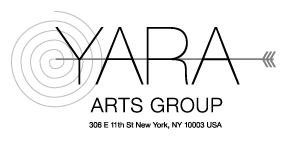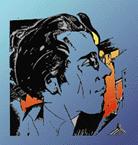
| BRAMA | Theatre | Events | Workshops | Translations | Series | Newsletter | Calendar | Store | Yara Home |


PAVLO TYCHYNA lived in Kyiv most of his life. His first collection Clarinets of the Sun (1918) brought him instant recognition as the major Ukrainian poet of his time. His work in the 1920s confirmed this position. In 1927 Tychyna was harshly criticized by the Communist Party. After several years of silence he became an official ode writer of Socialist Realism and censored his own early work.
In Detail
Pavlo Tychyna was the most important Ukrainian poet of the 20th century. He was born in a village near Chernihiv in North Central Ukraine, where his father was a teacher. As a student at the local seminary, he met Mykhailo Kotsiubynsky, the founder of Impressionism in Ukrainian literature, who greatly influence his work. In 1913 Tychyna moved to Kyiv and lived there most of his life. He worked on the editorial boards of several Kyiv newspapers which published his earliest work.
Tychyna's first collection "Clarinets of the Sun" (1918) reflected the joy and radiant energy of the revolutionary times. It brought him instant recognition as the major Ukrainian poet of his generation. His second collection, "The Plow," confirmed Tychyna's position in Ukrainian culture. Published in1919, it exuded enthusiasm for work and concrete action in the new era.
Tychyna lived in Kyiv through all 12 changes of government from 1917-1920 and in 1920 he published a slim collection of twelve poems which he titled "Instead of Sonnets or Octaves." The first poem "Dawn" acts as a prolog to eleven prose poems, each in two sections: the first very sparely outlines a scene, the second posits another possible look at situation. The poems grow darker as society crumbles around the inhabitants of Kyiv and the governments change at an increasing pace. Most powers arrive with guns pointed at the bewildered inhabitants who eventually turn into "beasts devouring beasts," as Tychyna put it. The collection "relies on a unique montage of reflection and dramatic vignette... It is an extended mediation on the idea and the reality of the Revolution..." noted George Grabowicz, the Chair of Ukrainian Literature at Harvard.
Tychyna suffered immediate repercussions for this publication and never allowed any of the poems to be republished, nor did he ever even mention this collection. The first full publication came well after his death, only as the Soviet Union was collapsing. Many hidden cultural treasures were then first unveiled. This dark collection did not find resonance in those years of hope.
Tychna's spiritual father was Hryhoriy Skovoroda (1722-1794) a poet and philosopher, who walked from village to village teaching people. Tychyna worked on a monumental epic he called "Skovoroda. Symphony," from 1920 to 1940 but never completed the work.
In 1927 Vlas Chubar attacked Tychyna, accusing him of "peddling nationalist opiate under the banner of proletarian art." After several years of silence, Tychyna published a very ambiguous collection, "Chernihiv," but then in 1934 "reconstructed" himself with "The Party Leads." His later collections confirmed his position as the official ode writer for Stalin and Socialist Realism in Ukraine. Tychyna even censored his own early work.
Tychyna studied languages throughout his life. In addition to Slavic languages, he was fluent in Georgian, Armenian, Turkish, Arabic and Hebrew.
Virlana Tkacz and Wanda Phipps have translated Tychyna's early work since 1989 and their translations have appeared in American literary journals and anthologies. These translatons were also used in two theatre pieces created by Yara Arts Group: "Light From the East/In the Light" (1990-91) and "1917-2017: Tychyna, Zhadan and the Dogs" (2017). Yara artists have often performed these translations of Tychyna poems various art and poetry events.